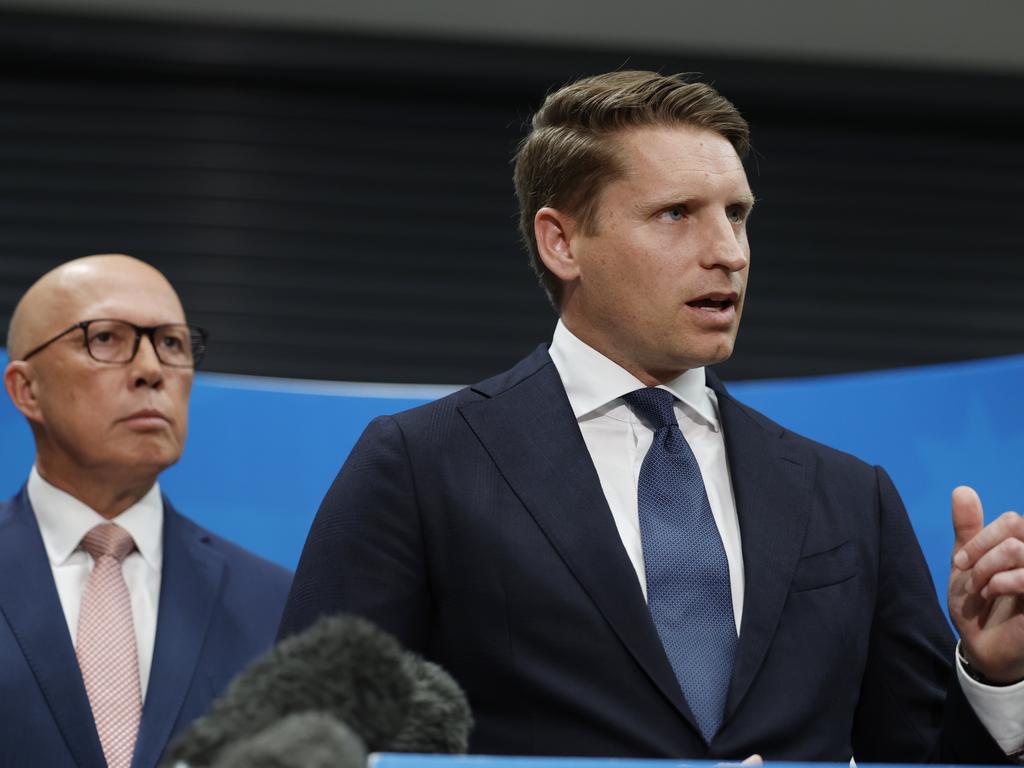
The Dutton opposition’s defence policy is much better than that of the Albanese government.
Labor deserves to lose the election on defence alone.
It has overseen continued weakening of Australia’s military capabilities, refused to make a meaningful defence spending increase, ignored the advice of everyone it has appointed to look at the situation, cannibalised key capabilities to pay for the distant AUKUS subs, and refused to make serious reform of the grotesque inefficiencies and paralytic delays in the whole defence process.
But saying Dutton’s policy is better than Labor’s exhausts every single thing that can be said in its favour.
It’s still too little, too late and shrouded in the most cack-handed amateurism in delivery, messaging and substance you could possibly imagine.
Dutton and his defence spokesman Andrew Hastie promise to lift defence spending from 2 per cent of GDP now to 2.5 per cent in five years. That’s too slow. Nearly half the increase lies beyond the first term of a Dutton government.
The press conference announcing the policy was bizarre. Dutton could barely bring himself to utter two cliches in a row about defence before desperately returning to his focus group talking points about bulk-billing rates, tax deductions for mortgage payments, petrol excise etc.
There was zero sense this is a Coalition priority, that it wants to campaign on defence.
Equally bizarre, there wasn’t even the most general outline of what military capabilities the Coalition wanted to acquire.

Dutton was too scared to mention China until forced. Beijing has defeated both Labor and the Coalition in an important, potentially debilitating development in Australian politics. Criticism of China now is seen by ethnic Chinese Australians as criticism of them.
This is a serious matter. Both sides of politics should refer to the Beijing government as the PRC, short for People’s Republic of China. The pro-Beijing orientation of so much Chinese language media in Australia should be better contested. The activities of arms of Beijing influence within the diaspora should be restricted so no Australian feels intimidated. That’s all for another day.
When questioned on the gobsmackingly nutty delay in getting this policy out, Dutton said it was because the Coalition had to see what the budget bottom line was first. In other words, the Coalition had to see how much social spending Labor was going to do, match almost all of it, add in all its own electoral bribes, then see what was left over for defence.
Nothing could better illustrate that the Coalition conceives defence policy in exactly the wrong way. You should decide what you need to do to make the nation secure and how much that will cost. Then you make your other spending decisions.
You don’t leave defence till last so you can adjust a few billion dollars one way or the other to accommodate electoral bribes. That’s the dismal old-think that has got us in the chaotic defence mess we inhabit today.
There’s still no explanation for the national media absence, until Tuesday, of Hastie. Simon Birmingham was a senior, competent, powerful voice in foreign affairs, who held the government to account, was on top of his brief, seldom made a mistake, had been a senior minister and had authority. Diabolically for the Coalition, he retired.
His replacement, David Coleman, is virtually unknown. With Hastie effectively in hiding, the Coalition pursued a national security election with the perfect trifecta: no visible defence spokesman, no visible foreign affairs spokesman, and no defence policy.
You couldn’t make it up.






